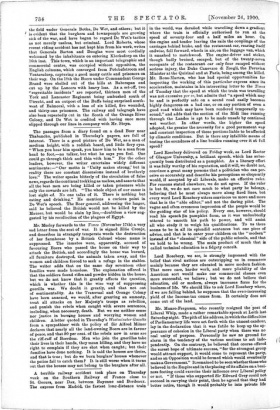Mr. Morley forwards to the Tinies (November 17th) a very
sad letter from the seat of war. It is signed Ellie Cronje, and describes in strangely temperate words the destruction of her farmhouse by a British Colonel whose name is suppressed. The inmates were, apparently, accused of favouring Boers who passed the house on their way to attack the British, and accordingly the house was burned, all furniture destroyed, the animals taken away, and the women and children forced to seek a refuge in the stables. The writer adds that on the same day seventeen other families were made homeless. The explanation offered is that the soldiers found rifles and powder hidden in the house, but we do not know that it greatly affects the question, which is whether this is the wise way of suppressing guerilla war. We doubt it greatly, and that not out of sentimentality. As the Transvaal and Orange Colony have been annexed, we would, after granting an amnesty, treat all attacks on her Majesty's troops as rebellion, and punish the rebels when caught with severe sentences, including, when necessary, death. But we see neither sense nor justice in burning houses and worrying women and children. A letter quoted in Thursday's Westminster Gazette from a sympathiser with the policy of Sir Alfred Milner declares that nearly all the land-owning Boers are in favour of peace, and that 90 per cent. of the rebels now in arms are the riff-raff of Boerdom. Men who join the guerillas take their lives in their hands, they mean killing, and they have no right to complain if they are shot when caught ; but their families have done nothing. It is said the houses are theirs, and that is true; but do we burn burglars' houses whenever the police fail to catch them? It is still worse when it turns out that the houses may not belong to the burglars after all.










































 Previous page
Previous page